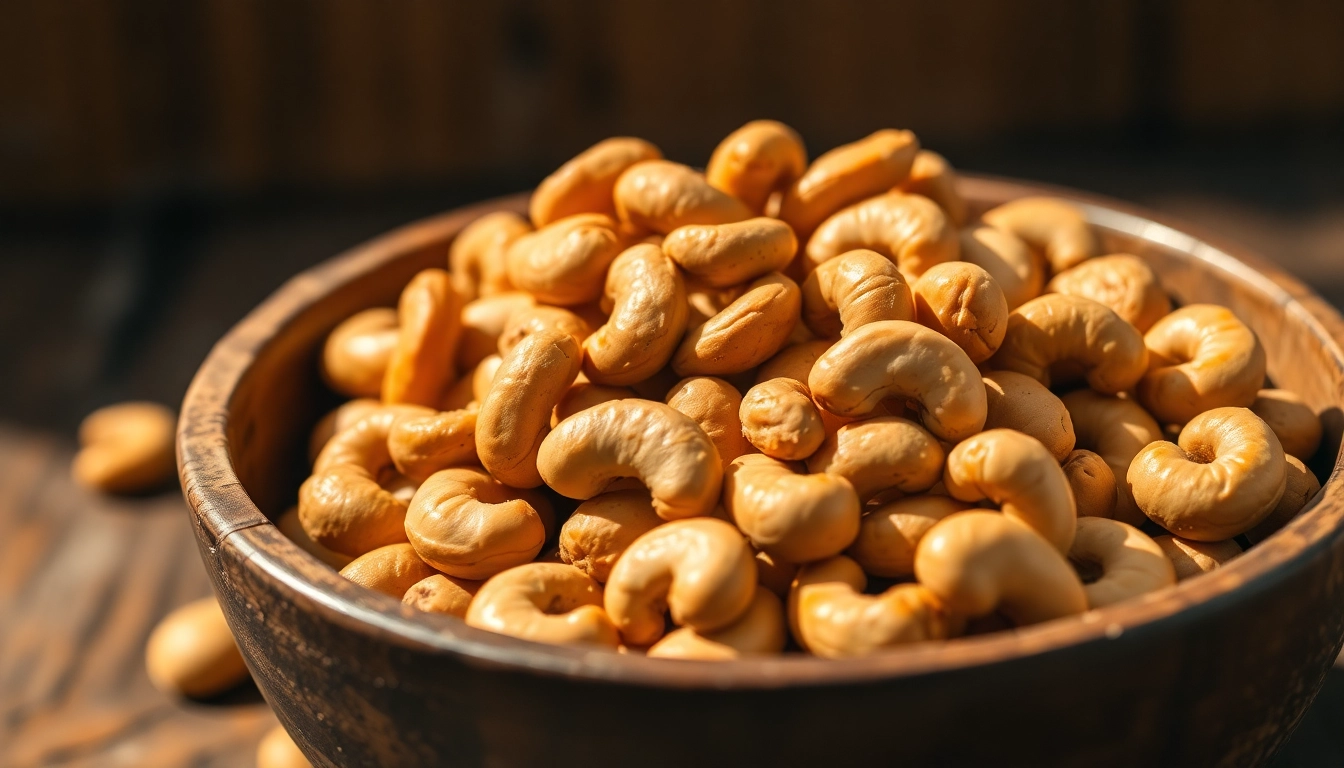Introduction to Cashew Nuts
Cashew nuts, scientifically known as Anacardium occidentale, are not only a tasty snack but also a nut packed with numerous health benefits and nutritional value. Historically, these nuts have been celebrated for their unique flavor and versatility in culinary applications. Whether enjoyed raw, roasted, or incorporated into recipes, cashew nuts offer a delightful taste while contributing to a balanced diet. For those looking to enhance their nutritional intake, exploring the benefits of Cashew Nuts is a good starting point.
What Are Cashew Nuts?
Cashew nuts are technically seeds that grow on the cashew tree. They are often associated with true nuts due to their culinary uses and taste. The nut is found at the bottom of the cashew apple, a fleshy fruit that’s often overlooked. Cashews are characterized by their kidney shape and rich flavor, which adds a unique creaminess to dishes ranging from savory to sweet.
The Origin of Cashew Nuts
Cashew trees are native to Brazil, specifically in the northeastern regions where they thrive in hot climates. The nuts have a long history, dating back to the indigenous cultures of Brazil who utilized them not only for their flavor but also for their medicinal properties. Cashew cultivation expanded through the Portuguese colonization to other tropical regions, and today, countries like India, Vietnam, and Nigeria are among the largest producers globally.
Nutritional Profile of Cashew Nuts
Cashew nuts boast a robust nutritional profile, making them an appealing choice for health-conscious individuals. A standard serving of cashews (about 1 oz or 28 grams) includes:
- Protein: Approximately 5 grams
- Fat: About 12 grams (mostly healthy unsaturated fats)
- Carbohydrates: Roughly 9 grams
- Fiber: 1 gram
- Vitamins and Minerals: Including magnesium, phosphorus, zinc, and copper
These components work synergistically to support various body functions, from energy metabolism to bone health.
Health Benefits of Cashew Nuts
Heart Health and Cholesterol
Regular consumption of cashew nuts has been linked with improved heart health. The unsaturated fats present in cashews can help lower LDL cholesterol levels, commonly known as the “bad” cholesterol, while raising HDL cholesterol, or the “good” cholesterol. A study published in the Journal of Nutrition indicated that individuals consuming a nut-rich diet exhibited lower risks of cardiovascular diseases.
Casuhew Nuts: A Great Source of Minerals
Cashews are rich in essential minerals such as magnesium, which plays a crucial role in over 300 enzymatic reactions in the body, including those related to energy production and muscle function. Furthermore, cashews provide substantial amounts of zinc, which is vital for immune function and skin health. They also contain copper, an important factor in the production of red blood cells and the maintenance of connective tissues.
Weight Management and Satiety
Despite their higher caloric content, studies show that incorporating cashews into a balanced diet can aid in weight management. The combination of protein, fiber, and healthy fats in cashews promotes a feeling of fullness, reducing the tendency to snack on less nutritious options. This satiety factor can be beneficial for those aiming to maintain or lose weight while still consuming adequate nutrients.
Incorporating Cashew Nuts into Your Diet
Creative Snacking Ideas
Cashew nuts can be enjoyed in a multitude of ways beyond simply eating them by the handful. Here are some creative snacking ideas:
- Spiced Cashew Nuts: Toss cashews with olive oil, salt, and your favorite spices such as cayenne pepper or garlic powder for a flavorful snack.
- Cashew Butter: Blend roasted cashews with a touch of salt and a bit of oil to create a creamy cashew butter, perfect for spreading on toast or adding to smoothies.
- Trail Mix: Mix cashews with dried fruits, seeds, and other nuts to create a wholesome trail mix. Great for on-the-go snacking.
Cashew Nuts in Cooking and Baking
Cashews also shine as an ingredient in various dishes. They can be used to create:
- Cashew Cream: Soak cashews and blend them with water for a vegan alternative to cream. It can be used in sauces, soups, or desserts.
- Curries: Cashews can be added to curries for added texture and creaminess, often complementing coconut milk.
- Salads: Chopped cashews make for an excellent topping in salads, providing a satisfying crunch.
Portion Control Tips
Given their calorie density, portion control is essential when enjoying cashew nuts. Here are some tips to help manage intake:
- Use small bowls or containers to limit the amount you consume at a time.
- Pre-portion servings into snack bags to avoid mindlessly reaching for the entire pack.
- Balance cashew consumption with other food groups for a well-rounded diet.
Myths and Misconceptions About Cashew Nuts
Are Cashew Nuts Really Nuts?
One common misconception is that cashew nuts are true nuts. In fact, cashews are classified as seeds because they come from the cashew apple, a fruit that grows on the cashew tree. This distinction is important as it highlights the botanical differences between various types of nuts.
Caloric Content and Weight Gain Concerns
There’s a prevalent myth that consuming cashew nuts will lead to weight gain due to their caloric density. However, research suggests that nuts, including cashews, can be part of a healthy weight management strategy. When consumed in moderation alongside a balanced diet, they can contribute to a healthy lifestyle.
Nut Allergies: Cashews vs. Other Nuts
Another concern often raised is regarding nut allergies. While cashews can trigger allergic reactions in some individuals, they are distinct from other nuts such as peanuts and almonds. It’s crucial for individuals with nut allergies to consult with healthcare providers to gauge their specific risks before adding cashews to their diets.
Where to Buy Quality Cashew Nuts
Online Retailers for Cashew Nuts
Online shopping has simplified the process of sourcing high-quality cashews. Reputable websites offer a wide variety of cashew nuts, including different flavors and forms, allowing customers to make informed choices based on nutritional needs. Some popular online retailers include Nuts.com and Amazon, where freshness and quality are often guaranteed.
Local Markets vs. Supermarkets
When choosing between local markets and supermarkets for cashews, it’s beneficial to evaluate the quality and freshness of the nuts. Local health food stores frequently have bulk bins where cashews can be purchased in smaller quantities. However, big supermarkets provide the convenience of one-stop shopping but may have less variety.
Evaluating Quality and Freshness of Cashew Nuts
When shopping for cashew nuts, consider the following tips for evaluating quality:
- Check the expiration date to ensure freshness.
- Look for packaging that protects the nuts from air and light.
- Examine the nuts; they should be whole and free from discoloration or an off odor.



